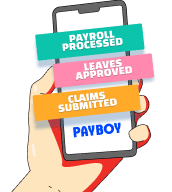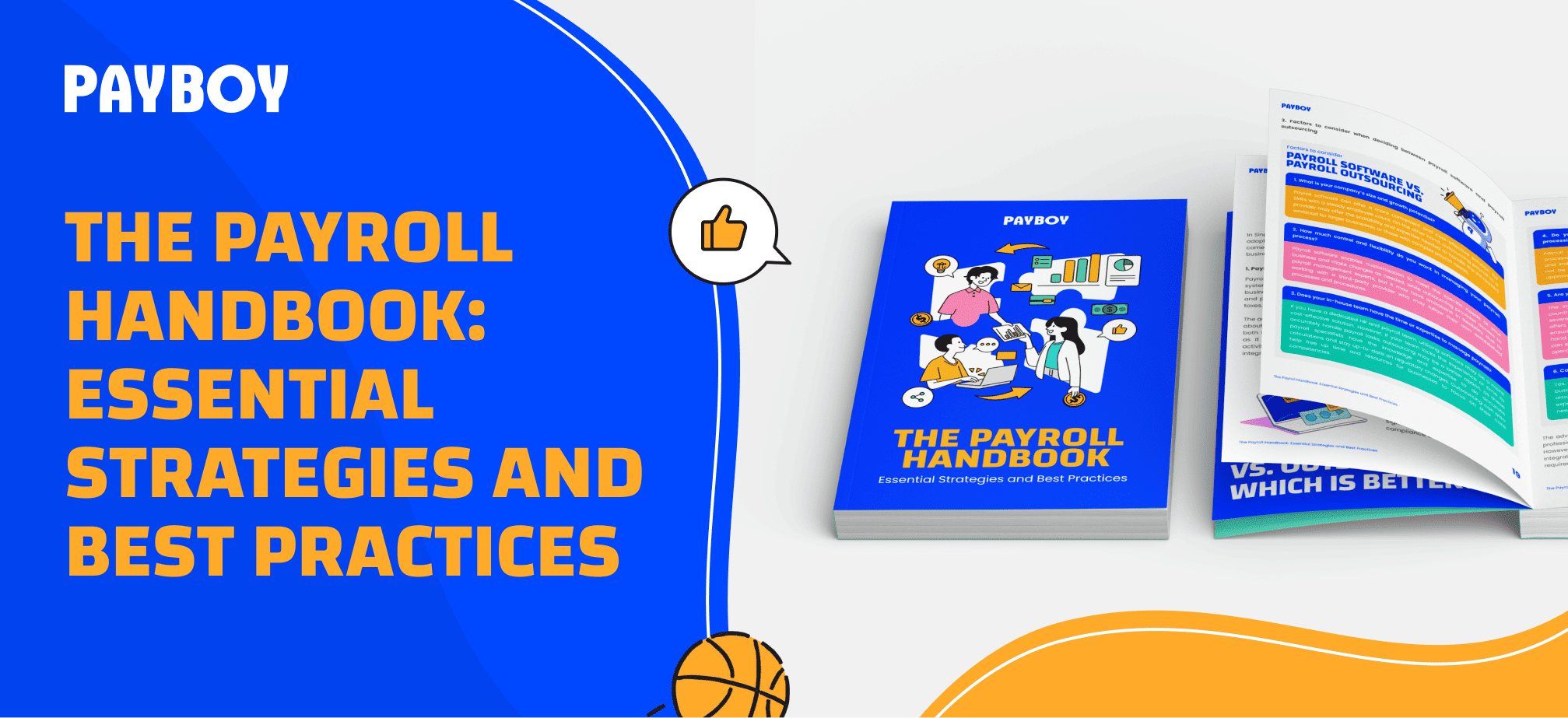In the fast-paced world of business, ensuring that your compensation processes run smoothly is not just a preference; it's a necessity. With the constant changes in work dynamics and the emergence of cutting-edge technologies, payroll software is breaking free from its conventional mould, pushing boundaries like never before.
We've curated invaluable insights, hands-on tips, and real-world examples to put into “The Payroll Handbook: Essential Strategies and Best Practices.” In this eBook, we'll dive deep into the common challenges faced by HR professionals and business owners when it comes to payroll management. But that's not all—this handbook will also offer strategies and best practices designed to optimise your payroll processes, boost efficiency, and ensure compliance.
Click here to download the full eBook for free!
Common pain points faced in payroll management
Despite being an essential business function, payroll management is one of the most dreaded HR jobs, as it is time-consuming, burdensome, and seemingly a dispensable task. To prevent potential legal and internal issues that can escalate into more significant problems in the future, it is crucial to understand the common pain points faced by HR professionals in Singapore.
1. Cope with administrative overload
Many small and medium-sized enterprises (SMEs) face administrative overload in payroll management due to budget constraints, leading them to handle payroll in-house manually. This manual process is prone to human errors, as employee payslips depend on various factors like monthly salary, sick leave, overtime, and tax deductions. Outdated methods can also result in miscalculations and mistakes, potentially leading to legal issues and employee dissatisfaction, placing added responsibility on HR staff.
2. Handle employee absences and time tracking
Tracking employees' multiple privileges and absences, such as National Service, maternity leave, incomplete months, and unpaid leaves, can be challenging. Accurately tracking this information on the payroll becomes more complex due to discrepancies like missing work hour logs or inconsistencies in manual records. These inaccuracies can potentially cause overpayments or underpayments and organisational confusion. Effective time tracking and absence management are crucial for ensuring compliance with labour regulations, optimising work schedules, and enhancing workforce efficiency and productivity.
3. Manage compliance issues
HR personnel often struggle to keep up with the ever-changing government policies and new terms in the Employment Act, posing challenges for maintaining compliance with payroll regulations. Non-compliance can lead to internal disputes and, in severe cases, government-imposed penalties and fines. Staying current and adapting to policy changes places a substantial burden on human resource teams.
4. Navigate payroll statutory contributions
In Singapore, the Central Provident Fund (CPF) is a significant contribution affecting both employers and employees and varies for each individual. In addition, various other levies, including the Foreign Worker Levy, ethnic levies for different ethnic groups, and the Skills Development Levy, further challenge HR teams. These contributions, coupled with tax deductions, present substantial obstacles that HR teams must accurately calculate and manage. Compliance with these statutory contributions is crucial for businesses to meet legal requirements and maintain a smoothly functioning payroll system.
5. Struggle with incompatible software
Despite technological advancements, numerous HR teams still grapple with outdated systems. Many businesses use manual payroll management or outdated HR software that lacks integration and compatibility. This results in HR staff struggling to combine functions such as payroll and leave management seamlessly, often requiring them to work with separate software platforms. This fragmented approach increases the risk of errors and necessitates additional manual efforts to collate data.
6. Have an inconsistent pay-run schedule
Timely payroll processing is a crucial concern, especially for SMEs, given the complexity of the process. Payroll delays can occur due to various factors, including inaccurate data, late timesheet submissions by employees, insufficient staff or expertise, banking issues, software glitches, and manual processing, which is prone to human errors. Weekends, holidays, and shifting regulations can also cause delays, which could affect payday timing and even result in non-compliance penalties.
Benefits of payroll automation for HR teams
Overall, payroll management presents significant challenges for HR professionals, often leaving them feeling overwhelmed and unfulfilled. To address these complexities, modern organisations are increasingly turning to human resource management solutions that can automate and seamlessly handle all HR processes, including payroll management.
According to McKinsey, an estimated 56% of tasks performed by HR can be automated without drastic changes to processes, while Gartner, Inc. revealed that nearly half of HR leaders cited HR technology as their top investment priority. Adopting efficient HR solutions can help companies overcome payroll challenges and empower their HR teams for greater effectiveness and productivity.
Check out the benefits of automating your payroll processes and get a glimpse into the future of payroll automation.
Strategies to optimise your payroll processes, increase efficiency, and enhance compliance
In-house payroll vs. Outsourcing: Which is better?
The choice between in-house payroll management and outsourcing in Singapore depends on your business's unique needs and considerations. While payroll software streamlines processes, improving accuracy and reducing administrative burdens for SMEs, payroll outsourcing offers peace of mind, compliance, and expert knowledge to handle regulatory changes.
Given the two options, how do you determine the most suitable choice for the specific requirements of your business? Here are six questions to consider before making your decision.
- What is your company’s size and growth potential?
- How much control and flexibility do you want in managing your payroll process?
- Does your in-house team have the time or expertise to manage payroll?
- Do you need more help managing your HR matters besides payroll processing?
- Are you planning to stay local or expand regionally?
- Can I choose both payroll outsourcing and payroll software?
HRIS, HCM, and HRMS: How to choose the right system for SMEs
Whether you choose in-house payroll management or outsourcing, utilising the appropriate HR software can effectively streamline your HR processes, automate manual tasks, and lead to significant time and resource savings. It is common to encounter confusion surrounding the terms HRIS, HCM, and HRMS, as they are often used interchangeably to describe HR systems.
- HRIS (Human Resource Information System) manages employee data, automating HR processes and improving data accuracy.
- HCM (Human Capital Management) includes HRIS features and goes beyond, encompassing talent management, workforce planning, and performance management to optimise the workforce.
- HRMS (Human Resource Management System) is a comprehensive solution, incorporating HRIS and HCM features along with payroll processing, claims management, and more.
When it comes to choosing among HRIS, HCM, and HRMS solutions, there are several factors that SME owners should consider to find the right fit for their companies. These factors include:
- Scalability
- Budget
- Flexibility
- User-friendliness
- Compliance
Get your Free eBook now to delve into comprehensive strategies for effective payroll management and discover three essential best practices to help you tackle challenges with confidence.
Streamline your HR processes with Payboy today!
As a PSG-approved HRMS, Payboy provides a robust system to help you manage your HR tasks so that you can focus on your business and people!
With our wide range of modules, you can customise a solution to meet the specific needs of your business:
Payroll Processing | Leave Management | Claims Management | Applicant Tracking | Time Attendance | Shift Scheduling | Appraisal System | Inventory Management | Project Costing | Training Management | Benefits





















